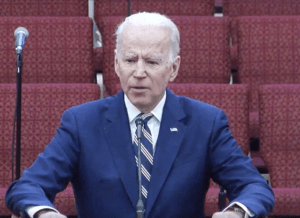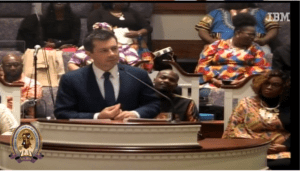Former Vice President Joe Biden said Sunday at a South Carolina Baptist church that the state’s African-American community “can make a judgment about who the next president of the United States is going to be.”
“That’s not exaggeration,” Biden said at Royal Missionary Baptist Church in North Charleston. “Literally, you are able to do this, because you have in your hands the power unlike any time in a long time to determine who the next Democratic nominee will be.”

Biden, 77, told the congregation at Royal Missionary Baptist Church that he wakes up sometimes almost wondering if the country is living in 1920 or 2020.
“When the African-American community decides we are going to move into Super Tuesday, as they call it, with a significant African-American vote, you can own this election,” Biden said. “You’re entitled to own it. It’s yours to determine.”
After finishing second in the Nevada Democratic presidential caucuses well behind frontrunner Bernie Sanders, both Biden and former South Bend, Indiana, Mayor Pete Buttigieg started off the week leading up to the key South Carolina primary Feb. 29 in church.
Buttigieg, who polled poorly with African-American voters in Nevada, introduced himself to First Baptist Church in James Island, South Carolina, as “a person of faith who takes from Scripture the obligation to stand up for those who are oppressed and those who are marginalized and those who are cast out.”
Quoting Matthew 23:11-12, “for those who exalt themselves will be humbled, and those who humble themselves will be exalted” and “the greatest among you will be your servant,” Buttigieg said “running for president at its best is an exercise in humbling yourself,” because you are asking people you don’t know for their vote.
“It is especially humbling in the middle of Black History Month to think about what it means to stand before African-American voters and ask them for their vote, because I know that that vote is not just an expression of a political preference,” Buttigieg said “It is something that was hard-won.”
“That vote is something that was kept often through violence out of black hands for generations and won only through struggle, through blood and through sweat and through tears and only won within living memory,” he continued. “And that vote, we know, is being suppressed today by means ranging from the closing of polling locations to the purging of rolls. So I know that when I am asking for that vote I am asking for something that is hard-won and not given lightly.”
Biden, who has an advantage with African-American voters as running mate on the ticket that led to the election of the only black president in U.S. history, said “I thought things had really changed” when he and Barack Obama were sworn into office.
“Then in 2017 something happened that I never thought would happen after Barack was president,” Biden said. “You saw those people coming out of the fields in Charlottesville, their veins bulging, carrying torches, chanting anti-Semitic bile and hate, accompanied by the Ku Klux Klan, and when a young woman was killed resisting the hate, the press asked the president ‘what do you think?’ He said there’s some very fine people on both sides. No president has ever said anything like that.”
Biden, 77, told the congregation at Royal Missionary Baptist Church that he wakes up sometimes almost wondering if the country is living in 1920 or 2020.
“We hear the voices of intolerance like we have not heard them in a long, long time,” Biden said. “They’ve never gone away, but for a while there they went away at least nationally. They went away in the White House. They went away in the leadership of this country, but we hear them today. We hear the chorus of hate and exclusion, the idea that in fact somehow some people aren’t deserving of respect, some people aren’t deserving of opportunity.”
“With Donald Trump as president, our core values, our literal standing in the world, our very democracy, everything that has made America, America is at stake,” Biden said. “I don’t think that’s an exaggeration. I never thought in my career I’d see a president quite like this, the way he treats people.”

“I know that the president is not there to be exalted, that the president is to be the chief servant of the people,” Buttigieg says at First Baptist Church in James Island, South Carolina.
“This guy is more George Wallace than George Washington,” Biden said. “This isn’t just an election. This is I think a battle for the soul of America.”
Buttigieg, 38, said he doesn’t claim to fully understand the experience of black Americans when it comes to issues like community policing and unequal access to healthcare but promised to surround himself with advisers who do.
“My point standing before you is not to claim that I understand more than I do, but rather to promise as the Scripture says, not to lean unto my own understanding too much but to do a lot of listening along the way,” he said. “Not to say that I get it, but to promise to always surround myself with people who will let me know when I don’t.”
Buttigieg reminded voters that when President Donald Trump took office, he said “I alone can fix it.”
“If there’s one thing that I know, one thing that you are humbled in the knowledge of when you are put in charge of anything, it is that nobody this side of Paradise can fix anything alone,” said Buttigieg, an Episcopalian.
“Above all, when a president who welcomes white nationalists into the White House and promises to return our country to the way things worked in the 1950s, something must change, and we must change it together, and that is what I am asking for your help in doing,” Buttigieg said.
“I know that the president is not there to be exalted, that the president is to be the chief servant of the people,” he said. “I’m seeking your support in the name of the idea that the presidency has a purpose and that the purpose of the presidency is not the glorification of the president. It is the unification of the American people and the empowerment to the American people to solve these problems and make these changes that we must make.”
